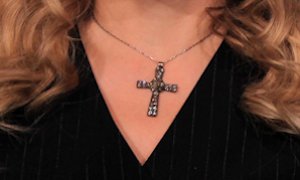 The European Court of Human Rights (ECHR) on Tuesday issued a landmark ruling on the right of employees to wear religious symbols at the workplace. The Strasbourg-based judges said that British Airways had discriminated against a devoutly Christian employee by making her remove a crucifix at work. Check-in clerk Nadia Eweida sparked a national debate in Britain over religion in public life when she was sent home in November 2006 for refusing to comply with rules banning employees from wearing visible religious symbols. She claimed she was a victim of religious discrimination, seeking damages and compensation for lost wages. British courts backed the airline, but Eweida went to the European Court of Human Rights.
The European Court of Human Rights (ECHR) on Tuesday issued a landmark ruling on the right of employees to wear religious symbols at the workplace. The Strasbourg-based judges said that British Airways had discriminated against a devoutly Christian employee by making her remove a crucifix at work. Check-in clerk Nadia Eweida sparked a national debate in Britain over religion in public life when she was sent home in November 2006 for refusing to comply with rules banning employees from wearing visible religious symbols. She claimed she was a victim of religious discrimination, seeking damages and compensation for lost wages. British courts backed the airline, but Eweida went to the European Court of Human Rights.
The judges ruled Tuesday that the airline had violated Eweida’s right to religious freedom, arguing (by five votes to two) that there had been a violation of Article Nine (freedom of religion) of the European Convention on Human Rights. "The domestic authorities failed to sufficiently protect the first applicant's right to manifest her religion," the judgment states, overturning decisions by British courts. The ECHR said domestic authorities had afforded "too much weight" to the employer's desire to project its corporate image. Eweida was awarded € 2,000 in compensation and € 30,000 in costs by the court.
 However, in the same ruling, the judges rejected the cases of a British nurse who was switched to a desk job after she also refused to remove a crucifix which she wore with her uniform. She was told health and safety in a hospital had precedence over her right to wear a religious symbol. The ECHR also denied the application of two other claimants from the UK, a marriage counselor who was sacked for saying that he might object to offering sex therapy to homosexuals, and a registrar who was disciplined when she refused to conduct same-sex civil partnership ceremonies. Their two claims were contrary to their respective employers' policy of non-discrimination against service users, said the court.
However, in the same ruling, the judges rejected the cases of a British nurse who was switched to a desk job after she also refused to remove a crucifix which she wore with her uniform. She was told health and safety in a hospital had precedence over her right to wear a religious symbol. The ECHR also denied the application of two other claimants from the UK, a marriage counselor who was sacked for saying that he might object to offering sex therapy to homosexuals, and a registrar who was disciplined when she refused to conduct same-sex civil partnership ceremonies. Their two claims were contrary to their respective employers' policy of non-discrimination against service users, said the court.
All four claimants based their cases on Articles nine and 14 of the European Convention of Human Rights, which protect freedom of religion and prohibit discrimination. The ECHR is a supra-national court established by the 1950 European Convention on Human Rights and hears complaints that a state has violated the rights enshrined in the convention and its protocols. Complaints can be brought by individuals or other contracting states, and the court can also issue advisory opinions. The convention was adopted under the auspices of the Council of Europe and all of its 47 member states are parties to it.
Read the ECHR judgment here.






